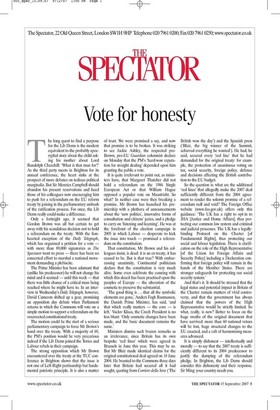Vote for honesty
The long quest to find a purpose for the Lib Dems is the modern equivalent to the probably apocryphal story about the child asking his mother about Lord Randolph Churchill: 'What is that man for?' As the third party meets in Brighton for its annual conference, the heart sinks at the prospect of more debates on tedious political marginalia. But Sir Menzies Campbell should abandon his present reservations and heed those of his colleagues now encouraging him to push for a referendum on the EU reform treaty by joining in the parliamentary ambush of the ratification process. For once, the Lib Dems really could make a difference.
Only a fortnight ago, it seemed that Gordon Brown was all but certain to get away with his scandalous decision not to hold a referendum on the treaty. With the lionhearted exception of the Daily Telegraph, which has organised a petition for a vote — with more than 89,000 signatories as The Spectator went to press — there has been no concerted effort to marshal a national movement demanding a plebiscite.
The Prime Minister has been adamant that (unlike his predecessor) he will not change his mind and it seemed — until this week — that there was little chance of a critical mass being reached where he might have to. In an interview in Wednesday's Daily Telegraph, however, David Cameron shifted up a gear, promising an opposition day debate when Parliament returns in which the Commons will vote on a simple motion to support a referendum on the resurrected constitutional treaty.
The motion could be the start of a serious parliamentary campaign to force Mr Brown's hand over the treaty. With a majority of 69, the PM's position would be very precarious indeed if the Lib Dems joined the Tories and Labour rebels in their campaign.
The strong opposition which Mr Brown encountered over the treaty at the TUC conference in Brighton shows that the issue is not one of Left-Right partisanship but fundamental patriotic principle. It is also a matter of trust. We were promised a say, and now that promise is to be broken. It was striking to see Jackie Ashley, the respected proBrown, pro-EU Guardian columnist declare on Monday that the PM's 'hard-won reputation for straight dealing' depended upon him granting the public a vote.
It is quite irrelevant to point out, as ministers have, that Margaret Thatcher did not hold a referendum on the 1986 Single European Act or that William Hague opposed a popular vote on Maastricht. So what? In neither case were they breaking a promise. Mr Brown has launched his premiership with a plethora of announcements about the 'new politics', innovative forms of consultation and citizens' juries, and a pledge to carry on 'listening and learning'. He was at the forefront of the election campaign in 2005 in which Labour — desperate to kick the issue into touch — promised a referendum on the constitution.
That constitution, Mr Brown and his colleagues insist, is dead: it is an ex-treaty, it has ceased to be. But is that true? With embarrassing unanimity, Continental politicians declare that the constitution is very much alive. Some even celebrate the cunning with which this deceit has been practised upon the peoples of Europe — the alteration of the cosmetic to preserve the substantial.
'The good thing is that all the symbolic elements are gone,' Anders Fogh Rasmussen, the Danish Prime Minister, has said, 'and that which really matters — the core — is left.' Vaclav Klaus, the Czech President is no less blunt: 'Only cosmetic changes have been made, and the basic document remains the same.'
Ministers dismiss such brazen remarks as an irrelevance, since Britain has its own bespoke 'red lines' which were agreed in Brussels in June this year. This may be so. But Mr Blair made identical claims for the original constitutional deal agreed on 18 June 2004. He boasted to the Commons three days later that Britain had secured all it had sought, quoting from Corriere della Sera (The British won the day') and the Spanish press (Blair, the big winner of the Summit, achieved everything he wanted'). He had, he said, secured every 'red line' that he had demanded for the original treaty: for example, the protection of unanimous voting on tax, social security, foreign policy, defence and decisions affecting the British contribution to the EU budget.
So the question is: what are the additional 'red lines' that allegedly make the 2007 deal sufficiently different from the 2004 agreement to render the solemn promise of a referendum null and void? The Foreign Office website (www.fco.gov.uk) offers only this guidance: 'The UK has a right to opt-in to JHA [Justice and Home Affairs], thus protecting our common law system and criminal and judicial processes. The UK has a legallybinding Protocol on the Charter [of Fundamental Rights], thus protecting our social and labour legislation. There is clarification on the role of the High Representative [of the Union for Foreign Affairs and Security Policy] including a Declaration confirming that foreign policy will remain in the hands of the Member States. There are stronger safeguards for protecting our social security system.'
And that's it. It should be stressed that the legal status and potential impact in Britain of the Charter remain matters of vivid controversy, and that the government has always claimed that the powers of the High Representative would be strictly limited. So what, really, is new? Better to focus on the huge swaths of the original document that have survived: more than 60 national vetoes will be lost, huge structural changes to the EU enacted, and a raft of harmonising measures advanced.
It is simply dishonest — intellectually and morally — to say that the 2007 treaty is sufficiently different to its 2004 predecessor to justify the dumping of the referendum pledge. In Brighton, the Lib Dems should consider this dishonesty and their response. Sir Ming your country needs you.

























































 Previous page
Previous page